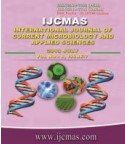


 National Academy of Agricultural Sciences (NAAS)
National Academy of Agricultural Sciences (NAAS)

|
PRINT ISSN : 2319-7692
Online ISSN : 2319-7706 Issues : 12 per year Publisher : Excellent Publishers Email : editorijcmas@gmail.com / submit@ijcmas.com Editor-in-chief: Dr.M.Prakash Index Copernicus ICV 2018: 95.39 NAAS RATING 2020: 5.38 |
HIV and TB co-infection is an alarming situation in the health care system. India has the third largest number of people living with HIV (PLHIV) in the world. This co-infection leads to difficulty in both diagnosis and treatment of TB resulting in increased mortality, morbidity, treatment failure and relapse. The present study was conducted to determine the prevalence of TB in PLHIV and also to determine its co-relation with the CD4 counts of the affected individuals. This is a prospective study conducted over a period of one year commencing from April 2017 to March 2018. Sputum and blood samples were collected from 288 HIV positive individuals who were clinically suspected to have TB as co-infection and samples were sent to Department of Microbiology, GMC Akola. Sputum analysis was done by Ziehl Nielsen stain and GeneXpert. CD4 counting of blood sample was done by Flow Cytometer. Among 288 individuals participated in the study, 147 individuals were associated with HIV TB co-infection.115 patients out of 288 (39.93%) were positive by CBNAAT and 32 (11.11%) were positive by sputum microscopy for acid fast bacilli. Out of these 115 CBNAAT positive patients, 23 (20%) showed rifampicin resistance. About 96 (65.30%) HIV and TB co infected individuals had a CD4 counts <200 cells/µl followed by 35 (23.80%) individuals with CD4 counts ranging between 200-300 cells/µl and in only 2 (1.36%) cases CD4 counts were more than 500 cells/µl. The present study emphasizes that co-infection with TB has been a major concern in HIV/AIDS patients. TB is the the most common opportunistic infection in HIV positive patients even at higher CD4 counts and most of the time remains smear negative. Hence early diagnosis and optimum management is necessary to reduce mortality and morbidity.
 |
 |
 |
 |
 |